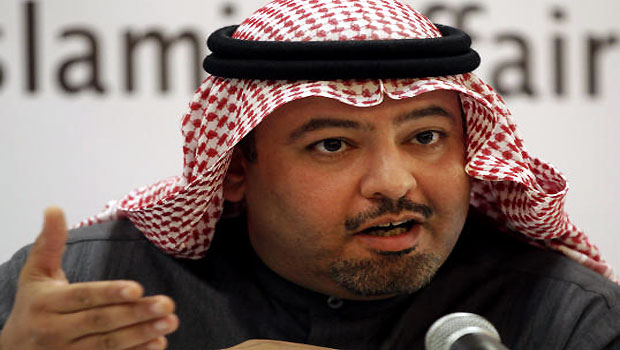
Bahrain’s Justice Minister Khalid Al Khalifa, speaks during a press conference in Manama, Bahrain. (AP)
Asharq Al-Awsat recently met with Sheikh Khalid Al-Khalifa, the Bahraini minister of justice and Islamic affairs, in Manama. Sheikh Khalifa has participated in all five dialogue sessions this year on behalf of the government. During the interview, the Bahraini minister gave his assessment of the progress so far and what he believes is necessary to resolve the country’s political differences.
The following is the full text of the interview:
Asharq Al-Awsat: Can you sum up what happened in the latest session (Wednesday 27 February)?
Sheikh Khalid Al-Khalifa: It was held in a positive way. There was a proposal to establish regulations for future sessions, particularly after the stances we have seen in past ones. This proposal was received positively, and an agreement has been reached on many procedural issues including the timing of future sessions, the time allocated for each participant to present his ideas, as well whether issues and mechanisms previously agreed upon will be open for discussion once again.
Furthermore, it has been agreed that minutes will be compiled at the end of each meeting and all participants will sign them. We also reached a consensus on how to deal with the issues where no agreement can be made.
Overall, this means that the latest session has been productive, positive, and auspicious, particularly as it ended with a unanimous agreement to start working out an agenda for future meetings. I think this will greatly facilitate work in the dialogue hall.
The latest session was treated seriously by all participants, and this has been reflected by the new agreements to push the dialogue forward. All participants agreed to delay the session that was due to be held on Sunday 3 March, in order to give time to establish regulations and prepare a preliminary draft for discussions. The next session will be held on Wednesday 6 March.
Q: Will one session a week be enough?
A: No, this will only happen in the beginning because preparing the draft agenda takes time and we must communicate with all the relevant parties. Therefore it was decided that the period between Wednesday 27 February and Sunday 3 March did not provide adequate time to achieve this task. Therefore, everyone agreed to cancel the next session because all parties want to put forth their views on the agenda in detail. One week should be enough to achieve this.
Q: Do you still think that the opposition group participating in the dialogue does not have decision-making rights?
A: This is due to the drawbacks that took place in the fourth session, which was held on 24 February. However, what happened last Wednesday was something different. I believe that the most important agreement was achieved in the latest session, namely that issues which have been agreed upon should not be resubmitted for discussion, and this applies to the rest of the dialogue sessions.
What is important and what has always been emphasized is that it is necessary to give all participants the chance for consultation and review, but once the decision has been made it cannot be retracted.
Q: The opposition has suggested a time-frame of three months for dialogue. Is this acceptable, or do you have another opinion?
A: I will express a personal opinion on this issue. I think that working out the agenda first will ultimately determine the time-frame for dialogue.
Q: The opposition has demanded high-level government participation in the dialogue, and this request dominated the previous session. What is the latest on this?
A: This point has already been agreed upon. The government is a major party in the dialogue, and we are working in accordance with this.
Q: Do you think that certain pressures are being exerted on some parties inside the dialogue hall?
A: We are holding a national dialogue and no one should cast doubts over the patriotism of any participant. We can only emphasize the need to strengthen political unity, and this is what the dialogue is for. The national element of this dialogue is being preserved by not allowing any foreign interference.
Q: Are there any foreign pressures being exerted on Bahrain to push towards dialogue or otherwise?
A: I do not think there are foreign pressures being exerted on Bahrain in general, whether pushing for or against dialogue. We are motivated by our desire for national unity, and to resolve political differences. This can only take place under the following conditions:
Firstly, there should be a secure atmosphere. This means that everyone should feel safe to express their opinions, and violence should not be used as a means to achieve certain political objectives.
Secondly, there must be pluralism. This means that everyone must participate while recognizing others and accepting their participation. The results of exclusion are well known from other countries, but this not taken place in Bahrain. We in Bahrain uphold pluralism as a basis for political action without sectarian, ethnic, or religious quotas.
